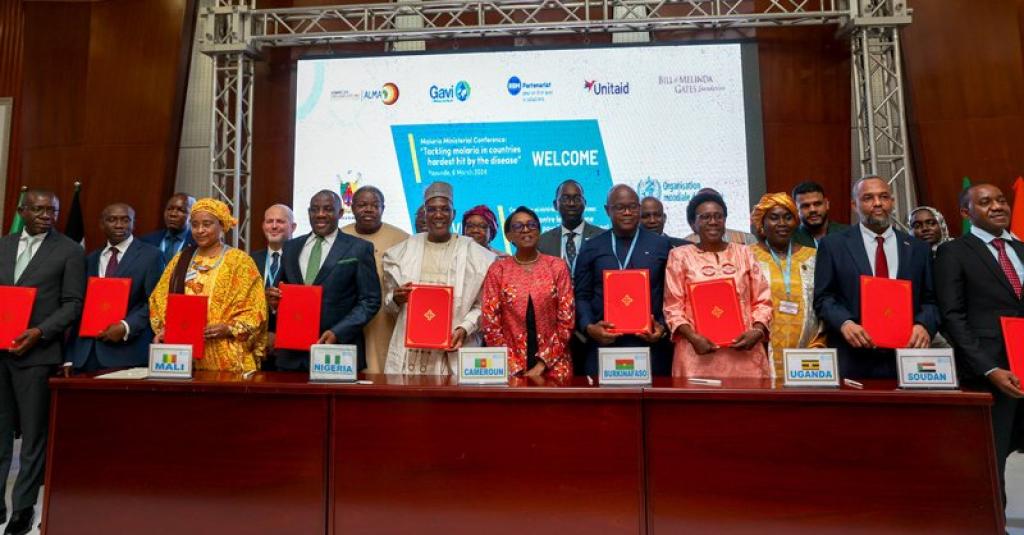But experts insist that such expressed political will must be accompanied by action on the ground
 Photo shared by Ngamije Daniel, Global Malaria Programme (GMP) Director, WHO on his X handle, @DrDanielNgamije
Photo shared by Ngamije Daniel, Global Malaria Programme (GMP) Director, WHO on his X handle, @DrDanielNgamije
In a historic gathering in Cameroon’s capital Yaoundé, African health ministers, global malaria partners, funding agencies, scientists, civil society organisations and other principal malaria stakeholders pledged to end malaria deaths, especially given the tools and systems available.
Globally, the number of malaria cases in 2022 surged significantly compared to the pre-COVID-19 era. The total cases rose from 233 million in 2019 to a staggering 249 million.
During this same period, the African region witnessed an alarming increase in cases, soaring from 218 million to 233 million. Africa remains the epicentre of the malaria crisis, bearing an immense burden. It accounts for 94 per cent of all global malaria cases and a staggering 95 per cent of global malaria-related deaths, totaling an estimated 580,000 deaths in 2022.
Significantly, the 11 African countries whose health ministers took part in the Yaoundé conference — Burkina Faso, Cameroon, Democratic Republic of the Congo, Ghana, Mali, Mozambique, Niger, Nigeria, Sudan, Uganda and Tanzania — bear the highest burden of global malaria infections and deaths.
While progress has stalled in the WHO Africa region which according to the 2017 WHO World Malaria Report accounts for “approximately 95 per cent of malaria morbidity and mortality,” the 11 African countries put together, “account for more than 70 per cent of the global malaria burden.”
Read Fight against Malaria in Kenya, Horn of Africa threatened by Asian vector
Health ministers from the 11 countries therefore declared their intension to sweep malaria under the carpet.
In what is now known as the Yaoundé Declaration issued Wednesday, March 6, the ministers voiced “unwavering commitment” in the fight against malaria, drawing upon a rich tapestry of global commitments and regional strategies, which includes commitment by African heads of state to allocate 15 per cent of their annual budgets to strengthening the health sector.
They underscored “the urgency of addressing the root causes of this stagnation”. This would include among other things, taking a closer look at the changing ecology and vector behaviour, ensuring better and quality access to health services, adequately handling humanitarian crises, including conflicts, natural disasters and migration; as well as climate change; and biological threats such as insecticide and drug resistance as well as emerging malaria vectors.
The ministers pledged to amplify investments in the health sector.
Their focus includes bolstering critical infrastructure, expanding personnel capacity and ensuring effective programme implementation.
Additionally, they aim to foster multi-sectoral collaboration and forge strategic partnerships for funding, research and innovation.
They expressed their “unwavering commitment to the accelerated reduction of malaria mortality” and “to hold each other and our countries accountable for the commitments outlined in this declaration”.
Read Africa not on track to eliminate malaria by 2030 as envisioned: Report
The declaration, however, made no new commitments and was thin in clearly articulated targets.
WHO Regional Director for Africa, Matshidiso Moeti, however, told a press conference in Yaoundé that the declaration marks a milestone in the fight against malaria.
“We welcome today’s ministerial declaration, which demonstrates a strong political will to reduce the burden of this deadly disease. With renewed urgency and commitment, we can accelerate progress towards a future free of malaria,” she said.
Cameroon Minister of Public Health, Manaouda Malachie said the declaration “reflects our shared commitment as nations and partners to protect our people from the devastating consequences of malaria. We will work together to ensure that this commitment is translated into action and impact”.
But experts insist that such expressed political will must be accompanied by action on the ground. The African Union targets controlling and eliminating malaria by 2030.
According to the 2023 Africa Malaria Progress Report, the “malaria incidence has declined by 7.6 per cent and mortality by 11.3 per cent, well short of African Union’s interim goals of 40 per cent reductions by 2020 and 70 per cent by 2025.”
It said that of the 46 member states reporting incidence of malaria, seven have achieved a 40 per cent reduction in either malaria incidence or mortality.
“Significant gains will need to be made to get the continent back on track,” the report states.
For such gains to be made, the continent needs to fill an existing financial gap of $1.5 billion “just to sustain basic malaria services, especially for vector control”.
The report warns that there will be significant surges in cases and deaths, especially among children and pregnant women, if urgent action isn’t taken.
“An additional $5.2 billion is needed annually to make progress towards elimination and another $11 billion annually to support climate adaptation in the Health Sector,” the report says further.
We are a voice to you; you have been a support to us. Together we build journalism that is independent, credible and fearless. You can further help us by making a donation. This will mean a lot for our ability to bring you news, perspectives and analysis from the ground so that we can make change together.


















































